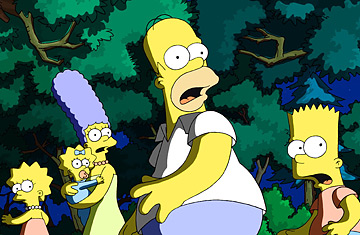
The Simpsons Movie
2007. Director: David Silverman. Writers (take a deep breath): James L. Brooks, Matt Groening, Al Jean, Ian Maxtone-Graham, George Meyer, David Mirkin, Mike Reiss, Mike Scully, Matt Selman, John Swartzwelder, Jon Vitti
With Dan Castellaneta, Julie Kavner, Nancy Cartwright, Yeardley Smith, Hank Azaria, Harry Shearer, Pamela Hayden, Tress MacNeille
20th Century Fox Home Entertainment
Available Dec. 18; list price $29.99
A while back I was working on a TIME profile of James L. Brooks, the writer-director (Terms of Endearment, Broadcast News) who was also a developer and caretaker of the Simpsons franchise. Besides letting me sit in on a taping of the show (woo-hoo!), Brooks confided that he, creator Matt Groening, show-runner Al Jean and the rest of Team Springfield were planning a Simpsons feature film. That was 1992. Fifteen years later, they finished the movie. In fact, they dawdled most of that time, and didn't get down to writing until early 2006; so the whole thing took a year and a half, an eye-blink in the gestation of an animated film. No matter how long or how short it took. The Simpsons Movie was worth waiting and paying for. Now you get to pay quite a bit more for the DVD.
In an ecologically threatened Springfield, Homer fouls the local lake with the refuse of a pig he's fallen in love with. (On the commentary track, someone recalls that Groening wanted the pig to have "a Porky Pig–type nose." Brooks: "I think what Matt said was, 'Give him a Jew nose.'" Jean: "One of the many similarities Matt has with Walt Disney.") The town is declared a disaster area, and an evil government bureaucrat orders that it be domed. Having alienated everyone with his idiocy, Homer must prove himself a hero: "Risking my life — to save people I hate — for reasons I don't really understand."
The film was rated PG-13 "for irreverent humor throughout." (Please tell us, MPAA, what is reverent humor?) The movie does have a glimpse of frontal nudity, but vulgarity was never the envelope The Simpsons pushed. Its goal was density, comic congestion, the vacuum-packing of cool gags and grotesque-sympathetic characters into the shortest span possible. So the little miracle of the movie version is that it plays out at four times the length without giving you a headache. The film finds its own pace, and it keeps its personality. It doesn't try to be ruder or kinkier, just bigger and better.
At the start of the commentary, Brooks announces that "We're recording this before the movie comes out." And Jean says, "We're not sure whether we want to all grab credit or flee from the film." Someone else, possibly producer Richard Sakai, says: "We're going to do a separate track that's just finger-pointing and blaming and apologies." (No need for any of that; the movie did just fine, earning about $400 million worldwide.) There are a just few deleted scenes. The writers did have access to a new computer program that allowed them to "pitch a joke, draw it and cut it in a week," as Jean says. But the creators of a cartoon feature do most of their editing before the cumbersome process of layouts and animation takes place. And since this script went through "literally a hundred drafts," there are plenty of unused gags to replay on the talk track.
You'll learn that the sign outside Rev. Lovejoy's church, which reads "THOU SHALT TURN OFF THY CELL PHONE," was originally meant to be (the much funnier) "STOLEN BIBLE AMNESTY DAY." In a mob scene, they help you spot a Lord of the Rings warrior, and note that there were originally dyslexics in the crowd, answering the cries of "Kill, kill, kill!" with "Lick, lick, lick!" It's an animated feature, so when the family takes refuge in the frozen north, there will be penguins. Jean: "We were writing this at the time of Happy Feet, and Surf's Up was coming out, so we were hoping to capitalize on the wave of anti-penguin fever sweeping America."
In a tactic new to me on DVD commentaries, the speakers stop the movie — freeze it on a frame that devolves into black-and-white — so they can discuss the church scene for an extra 2½ mins. They freeze a later image, of Homer broken-hearted on the ice, to spend 10 mins. with Castellaneta (who voices Homer, among others) and Smith (Lisa) talking about the emotional demands required of actors in animated shows. In short, it's tough. Extra points to Smith for referencing the series' first great episode, "Lisa's Substitute," which led to a primal confrontation of daddy and daughter ("Baboon, baboon, baboon!").
The exchange illustrates a rule Brooks laid down at the beginning of the series: Don't be afraid to show emotion. Audience, that goes for you too when you watch Homer and Marge's worst ever marital crisis. On big screen or small, you're permitted to sob away unabashedly.